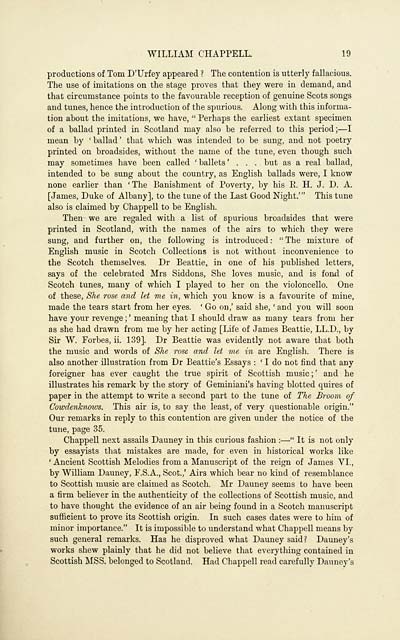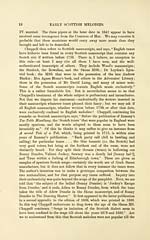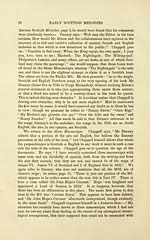Inglis Collection of printed music > Printed text > Early Scottish melodies
(41) Page 19
Download files
Complete book:
Individual page:
Thumbnail gallery: Grid view | List view

WILLIAM CHAPPELL. 19
productions of Tom D'Urfey appeared ? The contention is utterly fallacious.
The use of imitations on the stage proves that they were in demand, and
that circumstance points to the favourable reception of genuine Scots songs
and tunes, hence the introduction of the spurious. Along with this informa-
tion about the imitations, we have, " Perhaps the earliest extant specimen
of a ballad printed in Scotland may also be referred to this period; — I
mean by ' ballad ' that which was intended to be sung, and not poetry
printed on broadsides, without the name of the tune, even though such
may sometimes have been called ' ballets ' . . . but as a real ballad,
intended to be sung about the country, as English ballads were, I know
none earlier than ' The Banishment of Poverty, by his E. H. J. D. A.
[James, Duke of Albany], to the tune of the Last Good Night.'" This tune
also is claimed by Chappell to be English.
Then we are regaled with a list of spurious broadsides that were
printed in Scotland, with the names of the airs to which they were
sung, and further on, the following is introduced : " The mixture of
English music in Scotch Collections is not without inconvenience to
the Scotch themselves. Dr Beattie, in one of his published letters,
says of the celebrated Mrs Siddons, She loves music, and is fond of
Scotch tunes, many of which I played to her on the violoncello. One
of these, She rose and let me in, which you know is a favourite of mine,
made the tears start from her eyes. ' Go on,' said she, 'and you will soon
have your revenge ; ' meaning that I should draw as many tears from her
as she had drawn from me by her acting [Life of James Beattie, LL.D., by
Sir W. Forbes, ii. 139]. Dr Beattie was evidently not aware that both
the music and words of She rose and let me in are English. There is
also another illustration from Dr Beattie's Essays : ' I do not find that any
foreigner has ever caught the true spirit of Scottish music;' and he
illustrates his remark by the story of Geminiani's having blotted quires of
paper in the attempt to write a second part to the tune of The Broom of
Cowdenknows. This air is, to say the least, of very questionable origin."
Our remarks in reply to this contention are given under the notice of the
tune, page 35.
Chappell next assails Dauney in this curious fashion : — " It is not only
by essayists that mistakes are made, for even in historical works like
' Ancient Scottish Melodies from a Manuscript of the reign of James VI.,
by William Dauney, F.S.A., Scot.,' Airs which bear no kind of resemblance
to Scottish music are claimed as Scotch. Mr Dauney seems to have been
a firm believer in the authenticity of the collections of Scottish music, and
to have thought the evidence of an air being found in a Scotch manuscript
sufficient to prove its Scottish origin. In such cases dates were to him of
minor importance." It is impossible to understand what Chappell means by
such general remarks. Has he disproved what Dauney said? Dauney 's
works shew plainly that he did not believe that everything contained in
Scottish MSS, belonged to Scotland. Had Chappell read carefully Dauney's
productions of Tom D'Urfey appeared ? The contention is utterly fallacious.
The use of imitations on the stage proves that they were in demand, and
that circumstance points to the favourable reception of genuine Scots songs
and tunes, hence the introduction of the spurious. Along with this informa-
tion about the imitations, we have, " Perhaps the earliest extant specimen
of a ballad printed in Scotland may also be referred to this period; — I
mean by ' ballad ' that which was intended to be sung, and not poetry
printed on broadsides, without the name of the tune, even though such
may sometimes have been called ' ballets ' . . . but as a real ballad,
intended to be sung about the country, as English ballads were, I know
none earlier than ' The Banishment of Poverty, by his E. H. J. D. A.
[James, Duke of Albany], to the tune of the Last Good Night.'" This tune
also is claimed by Chappell to be English.
Then we are regaled with a list of spurious broadsides that were
printed in Scotland, with the names of the airs to which they were
sung, and further on, the following is introduced : " The mixture of
English music in Scotch Collections is not without inconvenience to
the Scotch themselves. Dr Beattie, in one of his published letters,
says of the celebrated Mrs Siddons, She loves music, and is fond of
Scotch tunes, many of which I played to her on the violoncello. One
of these, She rose and let me in, which you know is a favourite of mine,
made the tears start from her eyes. ' Go on,' said she, 'and you will soon
have your revenge ; ' meaning that I should draw as many tears from her
as she had drawn from me by her acting [Life of James Beattie, LL.D., by
Sir W. Forbes, ii. 139]. Dr Beattie was evidently not aware that both
the music and words of She rose and let me in are English. There is
also another illustration from Dr Beattie's Essays : ' I do not find that any
foreigner has ever caught the true spirit of Scottish music;' and he
illustrates his remark by the story of Geminiani's having blotted quires of
paper in the attempt to write a second part to the tune of The Broom of
Cowdenknows. This air is, to say the least, of very questionable origin."
Our remarks in reply to this contention are given under the notice of the
tune, page 35.
Chappell next assails Dauney in this curious fashion : — " It is not only
by essayists that mistakes are made, for even in historical works like
' Ancient Scottish Melodies from a Manuscript of the reign of James VI.,
by William Dauney, F.S.A., Scot.,' Airs which bear no kind of resemblance
to Scottish music are claimed as Scotch. Mr Dauney seems to have been
a firm believer in the authenticity of the collections of Scottish music, and
to have thought the evidence of an air being found in a Scotch manuscript
sufficient to prove its Scottish origin. In such cases dates were to him of
minor importance." It is impossible to understand what Chappell means by
such general remarks. Has he disproved what Dauney said? Dauney 's
works shew plainly that he did not believe that everything contained in
Scottish MSS, belonged to Scotland. Had Chappell read carefully Dauney's
Set display mode to: Large image | Transcription
Images and transcriptions on this page, including medium image downloads, may be used under the Creative Commons Attribution 4.0 International Licence unless otherwise stated. ![]()
| Special collections of printed music > Inglis Collection of printed music > Printed text > Early Scottish melodies > (41) Page 19 |
|---|
| Permanent URL | https://digital.nls.uk/94643764 |
|---|
| Description | Scottish and English songs, military music and keyboard music of the 18th and 19th centuries. These items are from the collection of Alexander Wood Inglis of Glencorse (1854 to 1929). Also includes a few manuscripts, some treatises and other books on the subject. |
|---|
| Description | The Glen Collection and the Inglis Collection represent mainly 18th and 19th century Scottish music, including Scottish songs. The collections of Berlioz and Verdi collected by bibliographer Cecil Hopkinson contain contemporary and later editions of the works of the two composers Berlioz and Verdi. |
|---|

